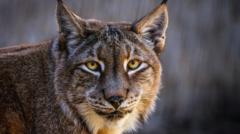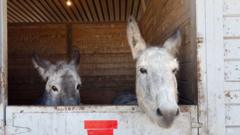Aalborg Zoo is actively seeking donations of live smaller livestock, stating that these animals provide an essential part of the natural diet of its predators, including lions, tigers, and the Eurasian lynx. Through a post on their Instagram account, the zoo highlighted its obligation to replicate the natural food chain, affirming that such feeding practices better mimic what these animals would hunt in the wild.
Owners wishing to donate can bring their smaller animals in on weekdays, with the donation of no more than four pets allowed without an appointment. Horses, on the other hand, can also be accepted under specific conditions such as having a horse passport and a clean bill of health in the past 30 days. The zoo offers a potential tax deduction for those donating horses, presenting a financial incentive alongside the ethical motivation of helping the animals at the zoo.
Pia Nielsen, the deputy director of Aalborg Zoo, explained that providing a diet that includes fur, bones, and other natural elements is crucial for the well-being of the zoo’s carnivorous inhabitants. "For many years," Nielsen noted, "we have been giving our carnivores smaller livestock. This practice is common in Denmark, and many of our guests appreciate this opportunity to contribute."
While the initiative has supporters, it has also sparked controversy and calls from animal welfare advocates to reconsider the ethics of using donated pets as food. This conversation reflects ongoing debates regarding the treatment and welfare of animals in captivity and the complexities involved in maintaining a natural ecosystem within a zoo setting.
The zoo's program, while aimed at enhancing the lives of its carnivores through a balanced diet, poses profound questions about animal rights and the responsibilities of pet owners. As Aalborg Zoo navigates this delicate balance, it highlights the need for continued dialogue on the ethics of animal care and the practical implications of sourcing food in a way that aligns with natural instincts.
Owners wishing to donate can bring their smaller animals in on weekdays, with the donation of no more than four pets allowed without an appointment. Horses, on the other hand, can also be accepted under specific conditions such as having a horse passport and a clean bill of health in the past 30 days. The zoo offers a potential tax deduction for those donating horses, presenting a financial incentive alongside the ethical motivation of helping the animals at the zoo.
Pia Nielsen, the deputy director of Aalborg Zoo, explained that providing a diet that includes fur, bones, and other natural elements is crucial for the well-being of the zoo’s carnivorous inhabitants. "For many years," Nielsen noted, "we have been giving our carnivores smaller livestock. This practice is common in Denmark, and many of our guests appreciate this opportunity to contribute."
While the initiative has supporters, it has also sparked controversy and calls from animal welfare advocates to reconsider the ethics of using donated pets as food. This conversation reflects ongoing debates regarding the treatment and welfare of animals in captivity and the complexities involved in maintaining a natural ecosystem within a zoo setting.
The zoo's program, while aimed at enhancing the lives of its carnivores through a balanced diet, poses profound questions about animal rights and the responsibilities of pet owners. As Aalborg Zoo navigates this delicate balance, it highlights the need for continued dialogue on the ethics of animal care and the practical implications of sourcing food in a way that aligns with natural instincts.















